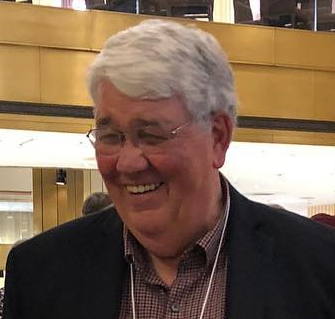“What do you want to be when you grow up?” It’s a question that youth have been asked since they graduated kindergarten. But in high school, the question becomes a much more pressing issue. In a culture obsessed with both success and control, students are encouraged at earlier and earlier ages to have their futures and career paths completely mapped out. And much of the decision making in this regard revolves around interests, skills, money, and the expectations of others. At the intersection of “What am I interested in, what am I good at, what will my loved ones approve of, and how much money can I make doing it?” is the decision to follow one career path over all the others.
What is too often excluded from this equation is the biblical reality of God’s call. We are called into being, called into relationship with the Lord and His Church, called to serve, and called into a yet unknown future by One who knows us better than we know ourselves, and who loves us beyond measure. For Christians, then, the primary question that needs to be answered is not, “What do I want to be when I grow up?” but rather, “What is God’s call on my life?”
Every kid in Sunday School has heard the story of young Samuel (I Samuel 3), to whom the Lord spoke in the middle of the night. Like many of us, Samuel struggled to recognize the voice of the Lord. In fact, it was Samuel’s older and wiser mentor, Eli, who helped Samuel recognize God’s voice and call on his life.
Although he failed to recognize God’s calling at first, Samuel was open to the Lord’s leading. After learning that it was God who was calling, he responded by saying, “Speak, LORD, for your servant is listening.” Are you listening for God’s call on your life? Are you open to His leading? You might hear God’s call during times of study or silent prayer. You may hear God’s call through the proclamation of His Word in a sermon or Bible study, through a petition in the Prayers of the Church, or through the lyrics of a hymn. Or even more likely, you may hear God’s call through family, friends, or church members who might say, “You would make a good pastor. Have you ever considered pursuing ordained ministry?”
One of Martin Luther’s gifts to the Church was his insistence that all callings are holy. Whether one is gifted and called by God to be a pastor, butcher, baker, or candlestick maker, each calling is equally holy and necessary for human flourishing, and for the building up of the Lord’s people. So how does one “hear God’s call?”
The first step is to recognize the Holy Spirit’s movement in your life. The older and more experienced Eli recognized that the Spirit was speaking to Samuel, and he encouraged Samuel to reply, “Speak Lord, for your servant is listening.” Only then could Samuel recognize the Spirit’s leading and respond in obedience to the call.
The truth is that most of us need an “Eli” at one time or another in our lives. And most, if not all of us, are also called to be an Eli for others. Being an Eli simply means keeping our eyes open to recognize the gifts of others and staying present to them — listening, talking, praying, and sharing with them. Finding an answer to every question is not always as necessary as just being a companion as they search and discern.
Jesus had compassion on the crowds he encountered because “they were harassed and helpless, like sheep without a shepherd” (Mark 9:36). Today there is a critical shortage of shepherds in God’s Church. Many congregations are without a called and trained pastor to preach His Word and administer the sacraments. How to explain this shortage? Has God gone silent? Is the Lord no longer speaking?
No. In fact, somewhere in our congregations right now is an infant who will be baptized this Sunday, who has a call to ordained ministry. Somewhere in our congregations right now is a fourth grader who has a call to ordained ministry, and who is also the absolute terror of Mrs. So-And-So’s Sunday School Class. Somewhere in our congregations right now is an eighth grader who has a call to ordained ministry. They are about to be confirmed, and they wish their parents would allow them to sleep in on Sundays, because “Church is boring.” Somewhere in our congregations right now is a high school sophomore who is preparing to attend the retreat that will change their life and confirm their call to ordained ministry. And somewhere in our congregations is a college student or career person who is running from God’s call to ordained ministry or has postponed it to pursue an alternative career path. I know this because each of these people was me at different points in my life.
Thankfully, the Lord strategically placed Eli’s in my life. My youth minister, Duane. My Sunday School teacher, Ruth. And my pastor, Reuben. Each of them, and many others, too, played the role of Eli in my life to help me recognize my spiritual gifts, to encourage my discernment of God’s call, to listen to my concerns, questions, and objections, and ultimately to walk with me to the “yes” that finally came when I filled out my seminary application.
Friends, there are many, many Samuel’s out there today who are called to serve and speak the Word of God, but instead of filling out a seminary application, they are pursuing a path that is more expedient or lucrative. They are pursuing a path that is more in line with the expectations of those around them.
So let me ask you to find your place in this biblical story. Are you a Samuel, knowing that there is a voice speaking to you and calling you to a purpose bigger than your own dreams and desires? Or are you an Eli, called to pay attention to the gifts of those with whom you worship? Called to encourage and walk with those who are or should be discerning God’s call to Word and Sacrament ministry? Either way, you are the answer to the crisis we face today in the Church of Jesus, where sheep without a shepherd are “harassed and helpless.” Every Samuel needs an Eli. And every Eli can recognize a Samuel with God’s help.
Pastor Jeff Morlock is Director of Vocational Discernment at the North American Lutheran Seminary. He may be reached at jeff.morlock@tsm.edu.














